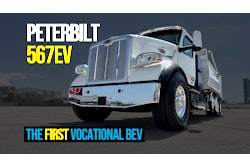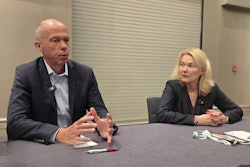California has regulated its own vehicle pollution since the 1960s, often enacting limits that exceed federal requirements, but the Trump administration seems to be wrestling back control.
Except for California, every state scheduled to adopt California’s rules this year and next has delayed them to 2027, modified them (in violation of the Air Quality Act), or is actively considering similar action. The remaining ACT states already have an adoption date of 2027.
Contents of this video
00:00 10-44 intro
00:19 California Air Resources Board (CARB) and the Advanced Clean Fleets rule (ACF)
03:12 The Clean Truck Partnership
05:06 What happens when the next presidential administration takes over?
05:50 Incentives for clean trucking fuels, renewable diesel and RNG
07:26 Tariffs impact on new and used heavy-duty truck market
Speaker 1:
Is California's rain is Sheriff of air quality. Over this week we take a look. You're watching CCJs 10 44, a weekly episode that brings you the latest trucking industry news and updates from the editors of CCJ. Don't forget to subscribe and hit the bell for notification so you'll never miss an installment of 10 44. Hey everybody, welcome back. I'm Jason Cannon and my co-host is Matt Cole. California has regulated its own vehicle pollution since the 1960s, often enacting limits that exceed federal requirements, but the Trump administration seems to be wrestling back control. Earlier this
Speaker 2:
Month, the California Air Resources Board said it would repeal its advanced clean fleets rule, which required certain trucking fleets in the state to transition to zero emissions vehicles beginning last year, and that the entire fleet be fully zero emissions between 2035 and 2042. Depending on a variety of factors. A CF also required all new heavy trucks sold in California to be zero emissions by 2036.
Speaker 1:
Now that action comes just a week or so after the US house passed two resolutions that would roll back strict state level emission standards enacted by carb, including the advanced clean trucks rule that requires manufacturers to achieve a certain increasing level of electric truck sales as a percentage of their overall sales.
Speaker 3:
If Congress, as you know, the Congressional Review Act was passed by the House. Now it's on the Senate side. They have until about the second week of June, the Senate does to pass that where they run out of time. We're all hearing that leader Thune intends to bring it to the floor. The issue with the parliamentarian deferring to the general counsel of the GAO that opined that the waivers are not rules for the purpose of the CRAI know that they're working to find a solution to that. They don't have to abide by that. There's ways to get around that, but they need a majority. And there are a few Republican senators who have indicated they're not real keen on overruling the parliamentarian, and I think all of us that are supporters of the CCRA are working to get that passed. And so I would suspect what are, we're May 12th, so we have approximately two and a half, three weeks basically it could drop any day.
I think as soon as leader Thune knows he has the sufficient boats, I think it's going straight to the floor and I think there's a couple of holdouts that are being actively worked and whipped to try to get the finish line. So if that happens, that's be kind of interesting. Right? So I was at the ACT Expo last week, two weeks ago, whatever it was, and on the panel, one of the regulatory panels was the deputy director of the number two at car. And the question was specifically asked if a CT is rescinded, whether by the Congressional Review Act or EPA rulemaking, what does that mean for a C? She said, it doesn't matter because we have the Clean Truck Partnership, the CTP in place where the OEMs agreed to abide by a CT regardless the way she phrased it, which is not the language in the agreement itself. She said, regardless of any threats to our authority to promulgate and enforce that rule, that's that's not what the agreement says.
Speaker 2:
The Clean Truck Partnership is an agreement between carb, the nation's leading truck manufacturers and the Truck and Engine Manufacturers Association that in short called for carb to grant some flexibilities to truck and engine manufacturers if those same manufacturers agreed not to litigate carbs regulations
Speaker 3:
In two different sections, that the OEMs agree to abide by a CT regardless of any outcomes of litigation. So I would submit that if a CT waivers are rescinded, the CTP is nullified and that will leave the OEMs in kind of a spot. Another interesting part is if a CT waivers are rescinded by CRA, the Clean Truck Partnership only applies to California as relates to the OEMs of buy-in by a CT timelines. So that means California would be the only state that has those aggressive timelines. The OEMs could do whatever they want in the other states that call 'em section one seventy seven states. So California would be lone wolf that would've put the OEMs in kind of an interesting spot, wouldn't it, as to what they want to do and what they're going to sell in California and so forth. So I expect the Senate to bring a CT to the floor within, probably not this week, but hopefully the following. Senator Murkowski, Senator Collins, those are kind of the two senators that are on the fence, if you will, on the bubble.
If a CT gets rescinded, it'll be interesting to see what the OEMs do, right? I mean, they're not selling any damn trucks either, so they're just as concerned is the dealer, right? I mean, they need to sell trucks. I've talked to a number of the, well, there's only five, right? But the handful, the OEMs and their production orders are down anywhere from 30 to 40% depend, right? So they need this to go away and I think they want it to go away. So once you see a CT repealed, I think there's going to be some activity between carb and OEMs,
Speaker 1:
As confusing as all this is, and as full of many false starts as we've already had when a new presidential administration takes over, this entire process could start all over again with new regulatory drafts.
Speaker 3:
A nuance in the Congressional Review Act that if any regulation is nullified by the CRA, that does have some precedential effect. The rule says that the statute basically says if a regulation is nullified by the CRA, the agencies are not able or allowed to promulgate substantially simmer rules. In other words, they can't just next administration, go right back to it. So it does have some lasting effect that might stop some of that ping pong.
Speaker 2:
A lot of emphasis has been placed on repealing or reversing what this industry sees as electric truck mandate, but Jim is hopeful that leads to more incentives for clean trucking fuels like renewable diesel or RNG credits for which expired last year.
Speaker 3:
I think that it needs to be kind of a simultaneous conversation because repealing the waivers and maybe reopening GHG three and maybe even changing the EPA Knox rule, those are big opportunities for these other fuel sources and incentivizing them in tandem. It makes good sense. And you've seen that the data, I'm sure on the carbon lifecycle benefits of say RMG versus Batter electric and be substantially better. And so we should be, in my opinion, on the policy side, be doing all we can to incentivize those and by letting those tax credits expire, that was counterproductive. I think on the Republican side, as they try to get their budget through reconciliation, you seen the dancer they're doing between slashing costs and providing tax incentives, and I know that both of those, the blender and the producer tax credits are in that consideration of every credit you provide. Then that means you have to slash more costs and they're doing that dance right now in dc. So I think it's a great opportunity, and I hope that both of those tax credits get reinstated because it would incentivize. You've seen the decrease in renewables since the tax credits expired. It is substantial, and now it's only in rare places can you even get those fuels anymore because the producers have cut production because of the lack of incentives. So it's a problem.
Speaker 1:
This entire ordeal has also thrown a wrench into a truck order cycle that's already been impacted by on again, off again, tariffs.
Speaker 3:
Big, small, medium fleet owners say they may just put a pause on their new orders and just run their equipment a little longer than they have been historically because of uncertainty both on the environment and on the tariffs. So yeah, you've seen the orders down year over year, I think with every OEM, and they're expected to kind of remain that way throughout the remainder of the year. I saw that the president of made some progress over the weekend with China and announcing the deal with the uk. So who knows where these tariffs are going to end up, but that's going to have a large factor as well. I would think that depending on the size of the fleet, the larger fleets, I dunno if any of 'em will just quit buying trucks, but they'll buy less new trucks and they'll expand the life cycle of some of their other trucks.
You've seen a surge in the used market, right? You've seen that. So if you're a fleet that can capitalize on getting quality use equipment, maybe you shift to that versus buying new. So I think that, well, I dunno what I think, but the data seems to suggest that the used market's going to continue to be pretty hot and that the new market's going to cool off some or not grow for sure. But yeah, if you need a truck, you need a truck. At least if a CT is repealed in those states that file California's hd, at least you'll be able to buy a diesel truck if they're repealed. So we have that going for us and the tariffs with this president, you never know what's going to happen, but I know the OEMs are working very hard trying to convince the White House not to impose those tariffs on heavy duty trucks, and we'll have to see how that plays out.
Speaker 1:
That's it for this week's 10 44. You can read more on ccj digital.com. While you're there, sign up for our newsletter and stay up to date on the latest in trucking industry news and trends. If you have any questions or feedback, please let us know in the comments below. Don't forget to subscribe and hit the bell for notifications so you can catch us again next week.









